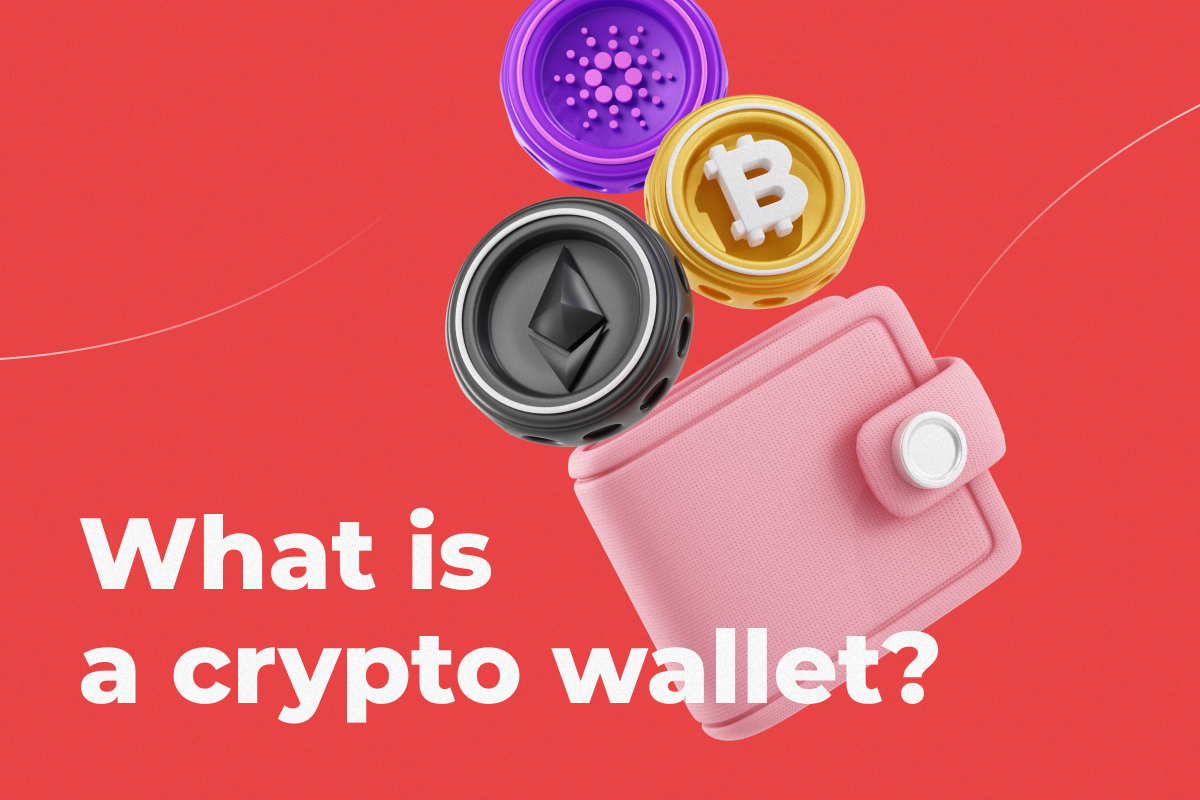What Is a Crypto Wallet?

Cryptocurrency wallets are an essential part of the crypto ecosystem — it is hard to imagine how the whole industry would operate without them. Crypto wallets are more than just storage: they make it possible for users to perform transactions on blockchain networks. Understanding and securely managing a crypto wallet is the first step towards successful and secure participation in the crypto market.
What Is a Cryptocurrency Wallet?
Without crypto wallets, individuals and businesses that want to interact with digital assets, be it crypto coins and tokens or NFTs, could hardly accomplish their goals. Cryptocurrency wallets are software programs designed to store and manage your cryptocurrencies. Unlike a physical wallet, a crypto wallet doesn’t actually “store” your digital assets in the conventional sense. Instead, it securely holds your wallet address and private keys — the critical information needed to authorize crypto transactions on blockchain networks.
For crypto users, understanding how these wallets function is key. A wallet address, akin to an email address, is your public identifier on the blockchain. It’s what you share with others to receive cryptocurrencies. Think of it like your account number in traditional banking, but for the blockchain. Every transaction linked to this address is recorded on the blockchain, ensuring transparency and security.

However, the real power of a crypto wallet lies in its private keys. These keys are what you use to prove ownership of your digital assets and to securely sign off on transactions. It’s paramount for users to keep these keys safe; if they are lost, so is access to the associated assets. With a variety of wallet types available, ranging from hardware wallets (physical devices) to software wallets (applications on a device), crypto users can choose the one that best fits their security needs and convenience preferences.
How Do Crypto Wallets Work?
Crypto wallets function as the interface between users and blockchain networks, enabling the management and execution of crypto transactions. When a user sets up a wallet, it generates a unique pair of cryptographic keys: a public key, which is transformed into a wallet address, and a private key. The public key or wallet address is what others use to send digital assets to the wallet. Technically, it works like a bank account number, but for blockchain transactions.
The private key, on the other hand, is somewhat similar to a highly secure password. It’s used to sign transactions, providing cryptographic proof that the transaction comes from the wallet’s owner. This process is vital for maintaining the security and integrity of transactions on the blockchain. The private key must be kept confidential; anyone who gains access to it can control the assets in the wallet.
When a transaction is initiated, the wallet software uses the private key to sign it, creating a digital signature. This signature helps verify that the transaction is legitimate and has been authorized by the wallet’s owner. The transaction is then broadcasted to the blockchain network, where it is verified by network participants (miners or validators) and added to the blockchain.
Crypto Wallet Types
Crypto wallets all come in different shapes and sizes. Although there are two main types of cryptocurrency wallets — hot and cold, or software and hardware — they are also often divided by whether they’re custodial or not. Let’s take a look at what this means and where the difference lies.
Custodial vs. Non-Custodial Wallets
Custodial Wallets. These wallets are managed by a third party, like a cryptocurrency exchange. The key feature here is that the private keys are held by the service provider, not the user. This setup offers convenience, as users don’t need to worry about managing their keys, and often, these wallets are user-friendly, making them a good choice for beginners. However, this convenience comes with a trade-off in control and security: if the provider faces security issues, users’ digital assets could be at risk. These wallets are ideal for those who prioritize ease of use and are willing to trust a third party with their assets.
Non-Custodial Wallets. In contrast, non-custodial wallets give full control to the user — like our AliceBob wallet. They are also sometimes called self-custody wallets. Here, you are responsible for your wallet’s private keys. This type of wallet offers greater security and autonomy because no third party can access your digital assets without your consent. The trade-off is that they require more technical knowledge and diligence in key management. If you lose your private keys, there’s no way to recover your assets. Non-custodial wallets are preferred by users who want full control over their crypto transactions and those comfortable with the responsibility of securing their keys.
Software Wallets
Now, let’s take a look at the more “well-known” crypto wallet types: hot and cold. Let’s start with hot wallets.
Hot crypto wallets are a type of digital wallet with a constant connection to the internet. This constant connectivity facilitates ease of access and convenience, which doesn’t go unnoticed: frequent traders and those engaging in regular crypto transactions tend to favor this solution. This category includes browser extensions, web wallets, desktop wallets, and mobile wallets.
Here are the key characteristics of hot wallets:
- Constant Internet Connection. They are online-based, allowing for quick and easy access to digital assets.
- User-Friendly Interfaces. Designed with accessibility in mind, they usually have intuitive interfaces suited for beginners.
- Additional Features. Since hot wallets often come in the form of an app, they may offer extra services, such as price alerts, news feeds, in-built exchanges, and more.
Additionally, despite being more vulnerable to online threats, hot wallets often incorporate various security measures, such as two-factor authentication and robust encryption protocols, to enhance safety. These features make hot wallets a versatile and convenient option for users who engage in frequent crypto transactions or small-scale investments.
Hot wallets are perfect for…
- Active Traders. Those who buy, sell, or trade cryptocurrencies frequently will find instant access advantageous.
- Casual Users. Individuals who hold smaller amounts of digital assets and prioritize convenience over high-level security might prefer hot wallets.
- Users Who Make Everyday Transactions. People who use cryptocurrencies for regular transactions, such as shopping or services, may find hot wallets better suited for their needs.
Hardware Wallets
Cold wallets, also known as cold storage wallets, are cryptocurrency wallets that are not connected to the internet. They are known for their enhanced security features, making them ideal for long-term storage of large amounts of digital assets. This category includes hardware wallets like USB devices, paper wallets, and other forms of offline storage.
Here are the key characteristics of cold wallets:
- Offline Storage. Cold wallets store cryptocurrencies offline, significantly reducing the risk of online hacking and cyber theft.
- Enhanced Security. Being offline, they are immune to online hacking attacks and unauthorized access.
- Physical Control: Users have physical control over their wallets, which means access to their funds is not reliant on third-party services or vulnerable online platforms.
Many hardware cold wallets offer backup and recovery options, ensuring that users can recover their funds even if the device is lost or damaged. Additionally, despite their offline nature, many cold wallets can be accessed via PCs or mobile devices when needed, allowing for flexible management of assets while maintaining security.
Cold wallets are ideal for…
- Long-Term Investors. Those who hold significant amounts of cryptocurrencies as a long-term investment appreciate cold wallets for their security and reduced risk.
- Security-Conscious Users. Individuals who prioritize the safety of their digital assets and prefer complete control over their private keys choose cold wallets.
- Large Asset Holders. Users with substantial crypto holdings benefit from the added security that cold wallets provide against potential online threats.
What Are Paper Wallets?
Paper wallets are a unique and a… let’s say, a more traditional type of crypto wallet. Falling under the category of cold wallets, they offer a high level of security for storing digital assets. Unlike a hardware wallet which is a physical electronic device, a paper wallet is essentially a physical document — often, a literal piece of paper — containing all the necessary data to access and manage your cryptocurrencies.

This data typically includes your wallet’s public address and private key, often presented in the form of QR codes for ease of use. The main advantage of a paper wallet is its simplicity and the fact that it’s completely offline, making it immune to online hacking attempts. However, since a paper wallet is the only way to access the stored assets, keeping it safe from physical damage or loss must be a priority.
How to Get a Crypto Wallet
If you’re just thinking of getting your first crypto wallet, the wide variety available on the market can be a little overwhelming. The first step to finding a good cryptocurrency wallet is understanding what type would suit your needs the best. Do you plan on owning a large amount of crypto? Would you like to make cryptocurrency transactions regularly, or is your intention to hodl?
Once you decide on the type of wallet you want to get, the next steps will involve selecting and then setting up your chosen wallet. A good place to start is always user reviews on Amazon or other shopping platforms for cold wallets and App Store or Google Play for hot wallets.
Hot wallets are incredibly easy to get. If you want a mobile one, like our AliceBob wallet, you can easily download it from app stores or directly from service providers’ websites. The same goes for browser extensions and other online wallets. Cold wallets can be purchased from reputable manufacturers and marketplaces or, in the case of paper wallets, generated using specific online tools.
After choosing your wallet type, follow the provider’s instructions to create and secure your wallet. This typically involves setting up security features like a strong password and backing up your recovery phrase, a critical step in ensuring you can regain access to your wallet if needed. Remember, the security of your crypto assets heavily relies on how well you manage and protect your private keys and recovery phrases.
How to Use a Cryptocurrency Wallet
Using crypto wallets involves a few essential steps, whether you’re a seasoned crypto enthusiast or new to the world of blockchain technology. First, understand the key pair: your public address and private key. The public address is like your account number, viewable on the public ledger, while the private key is akin to a password, granting access to your assets.
When transacting, enter the recipient’s public address, specify the amount, and confirm the transaction. Be mindful of the transaction fee, which varies based on network congestion and transaction speed. Remember to be careful and double-check everything.
For added security, back up your wallet, and make sure to keep your seed phrase — a series of words that can restore your wallet if your device is lost or damaged — safe. This is crucial for both types of crypto wallets, but especially for cold wallets, as they are a physical medium that can be lost or damaged.
Finally, for users interested in advanced features like NFTs, dApp integration, and so on, ensure your wallet supports these functions. Smart contracts technology allows you to use and interact with many projects and platforms — check them out!
FAQ: What Is a Crypto Wallet
What is the best crypto wallet?
Ledger and Trezor are typically considered the most reliable brands among hardware wallets. If you’re looking for a software wallet, you can try our AliceBob wallet, which supports a wide variety of cryptocurrencies and offers additional features such as an in-built exchange.
What is better, cold or hot wallets? Hardware vs. software wallets
It is important to select the type of wallet that meets your needs. A hot wallet is convenient and, therefore, ideal for frequent transactions, similar to a debit or credit card. This type of wallet is often linked to crypto exchanges for easy trading. A cold wallet is a hardware device that can provide higher security for long-term storage — much like traditional wallets, bank deposits, or vaults.
What is a crypto wallet address?
A crypto wallet address is a unique identifier used in cryptocurrency transactions. It functions similarly to a bank account number, allowing users to receive and send digital currencies. Each wallet address, which is a long string of alphanumeric characters, is derived from the public key of the key pair associated with your crypto wallet.